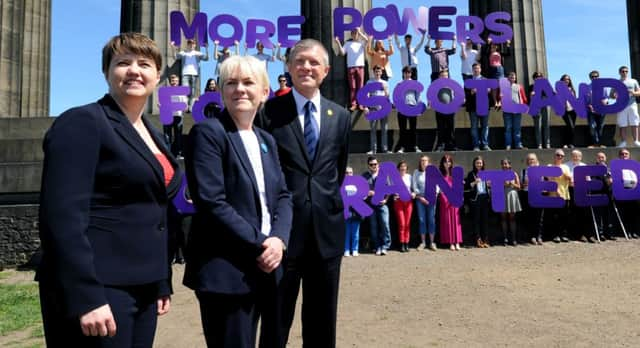Leaders: United front begins to crack


But while old enmities were temporarily forgotten, it is clear now they never went away.
All three unionist parties may have come together in the final stages of the long campaign to promise that the Scottish Parliament would benefit from more powers in the event of the rejection of independence. What those powers might actually be, however, is now causing past political tensions to bubble up to the surface.
Advertisement
Hide AdAdvertisement
Hide AdScottish Tory leader Ruth Davidson – one of the most significant figures in the campaign to save the United Kingdom – yesterday sought to take ownership of the referendum result.
Speaking at her party’s conference in Birmingham, Ms Davidson insisted that devolving complete control of income tax to Holyrood was her top priority.
As she spoke, former prime minister Gordon Brown was writing to his constituents a letter, in which he accused the Conservative Party of setting a trap over income tax.
Mr Brown wrote that the proposal to hand over control of income tax to Holyrood was designed to stop Scottish MPs from voting on key parts of the UK Budget. Furthermore, he claimed, such a plan would “put the Union at risk”.
The sound of political warfare breaking out among unionist parties will be music to the ears of the SNP’s First Minister-in-waiting, Nicola Sturgeon.
David Cameron’s initiative, immediately after the result of the referendum was known, of setting up a commission chaired by Lord Smith of Kelvin to agree a package of new powers for the Scottish Parliament was a wise one.
After two years of divisive – often ill-tempered – debate, some consensus on Scotland’s future within the United Kingdom is not only desirable, it’s essential.
But even before all parties meet, his lordship’s role looks more likely be that of referee than chairman.
Advertisement
Hide AdAdvertisement
Hide AdOf course, we should consider that party conferences by their very nature mean those participating are shouting loudly to their own people, although that message goes far beyond the hall, and into our homes.
Let’s hope, then, that some calm will soon follow.
Mr Brown is correct in his assertion that all parties have to be reminded again of both the no-strings-attached promises they made and their responsibilities to the whole country.
Lord Smith’s commission must deliver an offer to Scots that meets the public appetite for change. If its members go into talks having created new divisions among themselves then his work may prove intolerably difficult.
Had the tram ride? Buy the T-shirt!
WELL, it’s an idea, we suppose… The City of Edinburgh Council has come up with a plan – a wheeze, if you will – to claw back some of the £1 billion spent on the capital’s controversial tram scheme.
How will city leaders achieve this Herculean task? By appealing to the generosity of Edinburgh’s many tourists.
To scale models of London taxis and Eiffel Tower snow-globes, add merchandise emblazoned with the image of a tram.
Visitors to the city – and anyone local with more money than sense – will soon be able to buy clothes and mugs with pictures of trams printed on them.
For those who want to express more fully their love for a project that ran out of control before ending in muddle and compromise, model trams will be available.
Advertisement
Hide AdAdvertisement
Hide AdPerhaps parents could encourage their children to recreate the capital’s system by allowing the movement of these toys from the living room to the hall and no further, explaining that initial proposals to allow travel to the kitchen proved undeliverable.
It is easy to mock the city council’s plan to turn a chaotic project into a modern icon. But seriously, Scottish taxpayers may be more interested in answers about how the tram project is going to pay its way.
We hope, of course, that this idea goes some way to cutting the losses caused by the project. Perhaps one day, Edinburgh City Council and the Scottish Government may break even.
Maybe, just maybe, there actually are half a billion people just crying out for a new T-shirt with a picture of a tram on it.
Let us hope for lapses of sartorial judgment on an unprecedented scale.